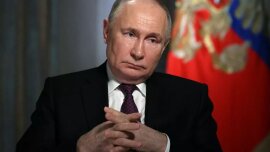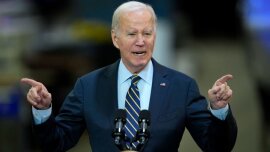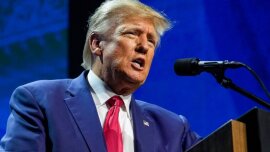Very soon, the first 100 days of Trump's new presidency will come to an end. After this, many analysts typically begin to summarize the preliminary results of the latest American administration's governance. Historically, the concept of 100 days was established by Franklin Roosevelt, who had to solve very serious economic problems, so he wanted his government to quickly implement the main provisions of his "New Deal." During the first 100 days, which began with his inauguration in March 1933, he passed several very important laws through Congress that radically changed American economic and social policy. Since then, it has been considered that 100 days is the period during which the presidential leadership style still appears new, and its strength and influence are often at their peak. Traditionally, to achieve success during the first 100 days, it is very important to strengthen the business reputation of the new administration, define the main lines of its domestic and foreign policies, and demonstrate initial successes.
Although Trump's 100 days of presidency have not yet passed, I think in many ways we can already draw certain conclusions with a high degree of confidence. I very much doubt that in the remaining week or two, anything will significantly change in the assessments of Trump's and his team's activities.
If I were to characterize the beginning of the new administration's activities in just a couple of words, I would say: complete chaos and bungling. Senseless lurching from side to side, illogicality and inconsistency in Trump's own actions; the incompetence of Trump's team, where key positions are held by people without the slightest experience in managing large structures or with absolutely inappropriate professional backgrounds; mass dismissals of federal employees as a way to fight the Deep State, some of whom then have to be urgently brought back; attempts to reduce the senseless spending of huge amounts of budget money in the form of various "feeding troughs," but as a result, for some reason, the US government debt ceiling has to be raised once again. And so on, and the like, and all this with great pomp, PR buzz, frequent lies or outright distortion of facts.
I admit honestly, this is not how I imagined the beginning of the new-old American president's activities. When back in June of last year, being almost 100% confident in Trump's victory in the presidential election, I published my article about Trump's connections to "Project 2025," I expected him to implement something akin to the main provisions of this document. Although Trump himself during the campaign vehemently denied his connection to the project, everything became clear after one of its main developers took a prominent position in Trump's team, managing the administrative and budgetary affairs of the White House. I remind you that "Project 2025," developed by the very influential conservative think tank The Heritage Foundation, proposed a radical restructuring of the entire state management system. Such restructuring requires first destroying the old bureaucratic management system, and then creating a new, smaller and more efficient one in its place, built on fundamentally new approaches to evaluating the activities of government officials. And while Trump and his team are doing quite well with the first part of the task—as they say, it's easier to destroy than to build—the implementation of the creative part is going much worse, one might say, simply depressingly. Which is not surprising: if you select people for management and other positions based on their devotion and loyalty, it's foolish to expect competence and high professionalism from them. These qualities, as a rule, don't combine well. Therefore, the principle of "hired the faithful, but demand as from the intelligent" is being implemented in all its glory in Trump's new administration, with all the resulting consequences in the form of chaos and disorder in many areas.
A huge contribution to creating such chaos is made by Trump himself, with one illustrative example being his trade war with the whole world in general, and with the main strategic enemy – China, in particular. I have already touched on this topic in my previous article on Hvylya, but here I want to look at it from another angle. What goals did Trump proclaim when starting this war? On one hand, he quite rightly pointed out that over several decades of globalism, the United States had lost its leading role as an industrial "superpower." Therefore, according to Trump and some of his economic advisers, it is necessary to establish extensive protective tariffs that will force foreign manufacturers to move production to the States in order to gain unhindered access to the premium American consumer market. It would seem a noble goal, one that's even difficult to argue with. On the other hand, Trump himself repeatedly said that the goal of his tariff policy is to conclude "fair" deals with other trading partners who, in his opinion, unreasonably hinder the access of American goods to their markets. And neither Trump himself nor anyone from his team is bothered by the logical contradiction of these two statements.
If you want to return industrial production back to the US, high tariffs mean reducing imports of industrial products now due to rising prices, in the hope that in the future many new factories and plants will be built that will significantly increase their production, creating more competition in the domestic market and, ultimately, prices will fall. In addition, a significant number of jobs with very decent salaries will appear. Theoretically, it's quite a workable idea. But even in the most ideal case, building new enterprises will take several years (for example, just replacing critical Chinese rare earth elements, more than 80% of which are produced there, initiated long before Trump under Biden, is possible in the US no earlier than 2028). And all this time, and even after that, you must maintain the same high tariffs to stimulate the development of new production. And all this time, American consumers, especially tens of millions of recipients of various social benefits, must patiently endure the significantly increased price levels in the hope of a bright future.
On the other hand, when you state that tariffs are introduced as revenge for unfairness from trading partners and promise to immediately reduce them to almost zero if the other side removes its restrictive barriers, this implies an increase in the volume of trade between countries after the conclusion of the deal. Such growth includes an increase in imports of industrial products from these countries when tariffs, or rather their absence, will no longer restrain it. This contradicts the goal of industrial "revival" mentioned above. Here you need to either take off the cross or put on pants; it's impossible to combine both in one tariff policy. That's why we see all these lurches, when first Trump imposes a 150% tax on Chinese goods, and then it turns out, surprise, that China accounts for more than 70% of all (!) phones and computers imported to the States, and Americans are not at all eager to wait 2-3 years until Apple moves its factories back from China (and they're not particularly eager to work at such factories either). So the tariffs on Chinese electronics have to be urgently canceled. And it's like this in everything: first we scare everyone with tens of percent in duties on virtually all American imports, causing financial markets to plummet and millions of ordinary Americans to watch in horror as their retirement savings go down the drain, and then we urgently introduce a 90-day pause to prevent this—after all, who could have thought such a collapse of American stocks might occur (that's sarcasm, if anything). Not the slightest sign of a deeply thought-out policy, just chaotic lurching and possible attempts to earn "a little bit" of money on stock market fluctuations for those especially close to the "body."
Another conclusion that can be drawn from Trump's almost-100 days of presidency is that rumors about his incredible prowess as a "deal-maker" turned out to be greatly exaggerated. All his "toughness" manifests well when the other side in negotiations significantly depends on the United States and has no resources to resist pressure. If such a side does not bend, readily goes to escalation, like China, or even openly or covertly tells the American president where to go, as was the case during Trump's first term from North Korea, then the "macho" Trump immediately deflates and feels very insecure, having not the slightest idea what steps to take next. Meanwhile, his advisers, due to the contradiction of "faithful vs. intelligent," are not particularly able to help their boss. As we know from history, dashing "cavalry charges" very rarely work in complex international relations, but apparently they either forgot to tell Trump about this or didn't dare to.
The most striking example of this is, of course, Trump's efforts to end the Russian-Ukrainian war. I won't even mention his promise to stop it in "24 hours," which has been mocked by just about everyone. But even more "realistic" timeframes from him of 2-3 months turned out to be completely devalued. The approach of a "double ultimatum," so heavily advertised by Trump himself, where on one hand, US military aid would be reduced to force Ukraine to peace, and on the other hand, Russia would be threatened with flooding Ukraine with all possible weapons if Putin doesn't agree to a peace deal, is ending with a complete fizzle. What do we see as a result? The threat toward Ukraine was not only voiced by Trump but also implemented, forcing Zelensky to significantly soften his statements regarding a possible ceasefire. On the other hand, there is absolutely no implementation of threats toward Russia, US aid to Ukraine has not increased by an iota, and moreover, there are not even verbal promises from Trump in this regard. Instead, we hear his numerous statements about Putin's peaceful intentions, not backed by any practical actions from Russia. There are repeated calls for Europeans not to escalate the situation with sharp anti-Russian statements and new demands for Ukraine to hand over more and more of Ukrainian natural resources and infrastructure to American management. A phenomenal "art of the deal," at which, according to his assurances, Trump has eaten a dog.
Soon, I believe, we will have the opportunity to observe another such skillful deal. I mean direct negotiations between the US and Iran, little covered, and absolutely in vain, in Ukraine. Since receiving the Nobel Peace Prize, which he dreams of so much, for ending the Russian-Ukrainian war is clearly not in Trump's immediate future, he now has a new "trick" - concluding a "historic" nuclear deal with Iran. The American official side maintains complete silence about these negotiations; even Trump himself, a great lover of wishful thinking, speaks in generalities. But leaks in Iranian and American media, periodically commented on in Israel, cause very great concern in Israel itself. If Trump accepts even part of the conditions voiced by Iran, it promises to very strongly change the situation in the Middle East for the worse. And the chances that Trump will agree to such a deal are not zero at all, including because after 100 days, he urgently needs to show at least some successes in international politics.
So far, all that Trump can really put in the piggy bank of his current achievements is the fight against illegal immigration. Reducing illegal crossings at the Mexican border by almost 100% is an undoubted success; you can't argue with that, although you can argue about the methods by which the Trump administration achieved such remarkable results. But this is a success in domestic policy, which is clearly not enough against the backdrop of the chaos created by Trump. And if Trump's "core" electorate is ready to forgive him any stupidity, the attitude toward him of many "swing" voters who voted for him as the lesser evil compared to Harris is changing significantly, as evidenced by recent public opinion polls. Trump himself may not care about this; with all his statements about the possibility of a third presidential term, he himself well understands the absurdity of such an undertaking. But the Republican party as a whole, which in a year and a half will face partial re-elections to the Senate, is put in an extremely unpleasant position by the chaotic and bungling nature of Trump and his team. Public criticism of Trump's policies promises Republican senators big problems with their own electorate, given the mass support for Trump among ordinary Republicans. On the other hand, supporting Trump's convulsive lurches or some of his frankly idiotic statements threatens to lose sympathy from "swing voters," who in many states have a decisive influence on the outcome of elections. So many Republican senators who are up for re-election in November 2026 are clearly not to be envied.
But for the Democrats, finally, there are the first signs of hope for better. The party, completely demoralized after Harris's crushing defeat, tired of its "advanced" progressive politics to a huge mass of Americans, has again taken heart and is beginning to feel much more confident. Interestingly, they don't particularly need to do anything to discredit Trump's policies; he is quite successfully handling that himself. The main thing is not to interfere with him by absolutely unrealistic calls for impeachment, numerous lawsuits over his every "sneeze," and similar nonsense. You just need to step aside and wait for half a year or a year, and Trump, with his "experiments" in domestic and foreign policy, will finally "bury" himself, and along with him the entire Republican party. And then the thousands-strong rallies that recently took place in many "Democratic" (i.e., led by Democrats) American cities will, after some time, gather millions and, moreover, across the entire country.
In general, the approaching end of Trump's 100 days of presidency can hardly be characterized as successful either for him or for the entire United States.

























